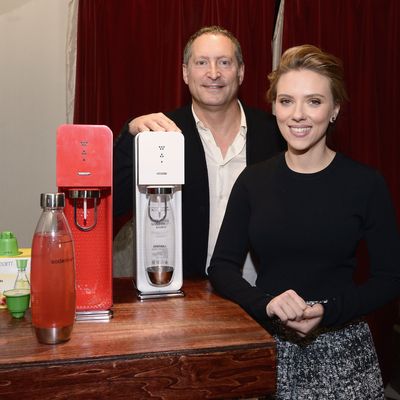
My first-ever holiday party was going great until someone in the living room wanted club soda for his vodka. It’s not that I wasn’t prepared. I was in the kitchen, overseeing eggnog, and I handed my co-host a bottle of seltzer made for the occasion with my SodaStream countertop carbonator. He’s the one who told me what happened next.
“Enjoy your Palestinian blood cocktails,” the left-wing reporter said to the vodka drinkers.
This wasn’t the first objection I’d encountered to SodaStream, which turns a bottle of tap water into sparkling with three pumps of a recyclable carbon dioxide cartridge. SodaStream is an Israeli company with a manufacturing plant in occupied territory in the West Bank, a fact that enrages a politically informed, far-left segment of the liberal-yuppie demographic the product is marketed to. By bringing environmental foodie-ism into conflict with humanitarianism, SodaStream has turned the most inoffensive of soft drinks — Sustainable! Sugar-free! — into a political liability for civilians and celebrities alike as they attempt to buy and endorse the correct products. Take Scarlett Johansson, who was named SodaStream’s “global brand ambassador” this week, in anticipation of a Super Bowl commercial starring the liberal actor and environmentalist. “‘Normalizing’ the Israeli occupation is a bad use of her celebrity,” wrote the Jewish Daily Forward disapprovingly. Although Johansson’s endorsement of the “guilt-free” bubbles has yet to boil into full-blown controversy, The New Yorker noted that it might be in conflict with her Oxfam International ambassadorship.
For non-famous SodaStreamers, beverage diplomacy is a question of etiquette. At a Thanksgiving with college friends, the appearance of SodaStream’s distinctive, reusable bottles was met with similar tut-tutting. “Blood bubbles,” someone called them. Defending herself, the hostess said the machine had been a gift. Now I say that too, even though I bought mine myself.
Others will sacrifice SodaStream’s sleek countertop design in order to save face. “A lefty journalist friend of mine in Tel Aviv has a machine he keeps under his kitchen sink so that he doesn’t get embarrassed when other lefties come over for dinner,” said Ali Gharib, a reporter covering Middle East issues.
SodaStream was popular in Europe in the seventies, but didn’t crack the North American market until the past five years or so, after the company was purchased by one of its Israeli distributors and installed current CEO Daniel Birnbaum. Since then, it’s become a staple of the gentrified Brooklyn kitchen, one of Food52’s 2011 must-haves, and the healthy, green alternative to Big Soda corporations poisoning America — or so an ad developed but rejected for last year’s Super Bowl hoped to suggest. And although the West Bank plant has drawn criticism — especially in Europe and Canada — the company has until now mostly dodged bad publicity in the U.S., touting its Palestinian job creation in a promotional video.
Many of SodaStream’s critics call for comprehensive boycott, divestment and sanctions of Israel (known as BDS), in the manner of apartheid South Africa. To them, settlement-made SodaStream is a point of entry to the debate. Last month, Adalah NY, Park Slope Food Co-Op Members for BDS and other groups protested outside Brooklyn’s Atlantic Terminal Target, calling for the chain to de-shelve SodaStream. They sang modified Christmas carols like “SodaStream Is Obscene,” a version of “Jingle Bells,” and “Soda, Baby,” set to the tune of “Santa Baby.”
But others, including the Atlantic contributing editor Peter Beinart, propose boycotting only settlement trade, which, he argued in the New York Times, threatens to “delegitimize democratic Israel.” “Liberal Zionists say they want to save Israel by boycotting the settlements,” said Philip Weiss, the MondoWeiss editor who describes himself as anti-Zionist. “Well, at the Super Bowl, one of the most looked-at ads is advertising something made in the settlements. If you want a two-state solution you should not be buying this.” Weiss left the SodaStream his mother bought him as a gift in her foyer, over his wife’s objections. Still, he holds his tongue when he’s served SodaStream seltzer by anyone but his mother. “I’m not that much of a pain in the ass but I’m pretty upset about it.”
Even the most fervent anti-Zionists will admit that, for seltzer addicts, SodaStream’s competitors leave something to be desired. iSi’s Twist’n’Sparkle was recalled after a series of dangerous bottle explosions. The Primo Flavorstation — now teamed up with Cuisinart — is a near fit, but its gas cylinder refills are harder to locate. So some fans devise elaborate work-arounds. After Gharib informed his SodaStream-owning cousin of the product’s settlement origins, the cousin began a “subversive campaign” to undermine SodaStream’s business model by using the gas cylinders, then mailing them back to the company claiming they’d been defective and receiving free replacements in return. “This went on for a year,” Gharib said.
Novelist and Code Pink activist Nancy Kricorian uses similar rationale when confronting friends about their SodaStreams. “The bulk of the profit comes not from the machine but from the refill,” she said. “If you can find an alternative source for the CO2 you can decrease your guilt by about 75 percent.”
After researching SodaStream alternatives, Palestinian rights activist Henry Norr elected to grow his own, using sugar, yeast, and an elaborate system of tubes, bottles, and clamps purchased through My Pop Old Fashioned Soda Shoppe. “I’m a little embarrassed because it seems so trivial and inane … It’s a classed product to begin with,” he said of the anti-SodaStream campaign. “I was never a soda drinker before doing the research,” he admitted.




